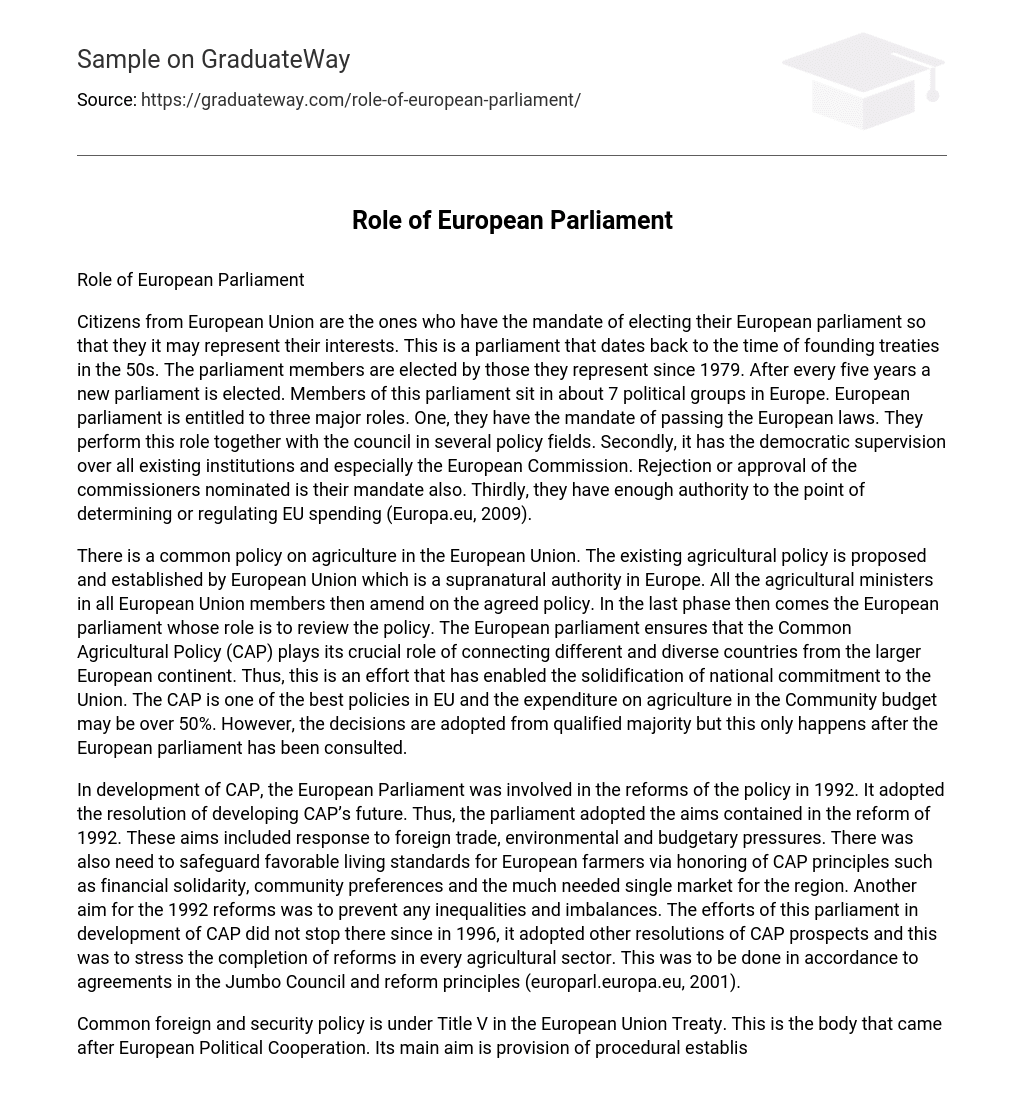Citizens from European Union are the ones who have the mandate of electing their European parliament so that they it may represent their interests. This is a parliament that dates back to the time of founding treaties in the 50s. The parliament members are elected by those they represent since 1979. After every five years a new parliament is elected. Members of this parliament sit in about 7 political groups in Europe. European parliament is entitled to three major roles. One, they have the mandate of passing the European laws. They perform this role together with the council in several policy fields. Secondly, it has the democratic supervision over all existing institutions and especially the European Commission. Rejection or approval of the commissioners nominated is their mandate also. Thirdly, they have enough authority to the point of determining or regulating EU spending (Europa.eu, 2009).
There is a common policy on agriculture in the European Union. The existing agricultural policy is proposed and established by European Union which is a supranatural authority in Europe. All the agricultural ministers in all European Union members then amend on the agreed policy. In the last phase then comes the European parliament whose role is to review the policy. The European parliament ensures that the Common Agricultural Policy (CAP) plays its crucial role of connecting different and diverse countries from the larger European continent. Thus, this is an effort that has enabled the solidification of national commitment to the Union. The CAP is one of the best policies in EU and the expenditure on agriculture in the Community budget may be over 50%. However, the decisions are adopted from qualified majority but this only happens after the European parliament has been consulted.
In development of CAP, the European Parliament was involved in the reforms of the policy in 1992. It adopted the resolution of developing CAP’s future. Thus, the parliament adopted the aims contained in the reform of 1992. These aims included response to foreign trade, environmental and budgetary pressures. There was also need to safeguard favorable living standards for European farmers via honoring of CAP principles such as financial solidarity, community preferences and the much needed single market for the region. Another aim for the 1992 reforms was to prevent any inequalities and imbalances. The efforts of this parliament in development of CAP did not stop there since in 1996, it adopted other resolutions of CAP prospects and this was to stress the completion of reforms in every agricultural sector. This was to be done in accordance to agreements in the Jumbo Council and reform principles (europarl.europa.eu, 2001).
Common foreign and security policy is under Title V in the European Union Treaty. This is the body that came after European Political Cooperation. Its main aim is provision of procedural establishment of a unified policy in defence. It has the common position of ensuring there is improved coordination and systematic cooperation. The European parliament role in development of this policy is depicted in the adoption of annual assessment in the activities of European Union. For the European parliament, their role is to see that future priorities of the policy are effectively outlined. This is done with the aim of coming up with a more strategic and a coherent approach so that EU may properly function like a global player. European Parliaments seeks to develop a more ambitious foreign policy. Moreover, European parliament has been continuously engaged in dialogue with the commission and the council in various levels to develop a vital implementation, financing, monitoring and formulation of European Union External Action Service (Europa.eu, 2009).
Powers of this parliament may vary depending on the policy area in question. In case of consultation procedures, the European parliament must produce its own opinion. The council only takes the decision and must wait for the opinion from Parliament. On cooperation procedures, there is a chance for the parliament to give its reading. Parliament in this case has the powers to reject the reading of the council or to adopt other amendments (Bekman, 2009). On budget procedures, there is a reading from parliament and the council and the parliament has power to come up with a solution on several of them. Lastly on assent procedures, there must an approval from European Parliament. In this case, there is only one reading and the decision taken by the Parliament is final as there are no additional amendments. This is supposed to be adopted by the council the way it is.
References
Bekman, S. (2009). What are the powers of the European Parliament? Retrieved from http://stason.org/TULARC/travel/european-union-eu/What-are-the-powers-of-the-European-Parliament.html
europarl.europa.eu (2001). European Parliament Fact Sheets. Retrieved from http://www.europarl.europa.eu/factsheets/4_1_2_en.htm
Europa.eu (2009). The European Parliament. Retrieved from http://europa.eu/institutions/inst/parliament/index_en.htm
Europa.eu (2009). Common Foreign and Security Policy. Retrieved from http://europa.eu/legislation_summaries/institutional_affairs/treaties/amsterdam_treaty/a19000_en.htm





